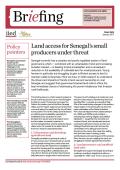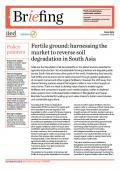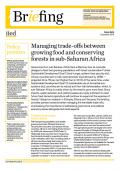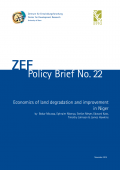
Senegal currently has a complex and poorly regulated system of land governance, which — combined with an urbanisation trend and increasing outsider interest — is leading to land privatisation and a consequent reduction in the availability of cultivable land for small producers. Young farmers, in particular, are struggling to gain...

Soils are the foundation of all terrestrial life on the planet and are essential for agricultural production. Yet unsustainable farming practices are degrading soils across South Asia and many other parts of the world, threatening food security.
Soil fertility and structure can be vastly improved through greater applications of compost...

Governments in sub-Saharan Africa face a dilemma: how to reconcile pledges to feed fast-growing populations with forest conservation? Under Sustainable Development Goal 2 (end hunger, achieve food security etc), African countries aim to fully meet domestic food demand by 2030 — projected to be 70 percent higher than in 2010...

Sub-Saharan Africa faces the worst land degradation in the world. This jeopardizes its efforts to reduce poverty as most rural livelihoods depend heavily on natural resources. Although a number of policies and strategies have been designed to reduce poverty and achieve food security, more has to be done. This study...

Land degradation is a severe economic and environmental challenge for Uzbekistan. It has a negative impact on agricultural production, and on rural incomes and livelihoods. It thus poses one of the major problems for sustainable development in Uzbekistan, though numerous efforts to address it have been made. Uzbekistan's government is, for example, planning to allocate more than 1 billion...

Niger’s natural resource management policies and institutions in colonial and post-independence times have discouraged landowners to plant or protect trees. The consequent land clearing led to severe scarcity of tree products. Firewood collection – mainly done by women – became a full-time task, especially after the prolonged drought period. Niger...

This report identifies key rangeland ecosystem service benefits (food, fuel, construction material, ground water, genetic diversity, climate regulation, recreation and spiritual inspiration) in southern Botswana’s Kgalagadi District. It assesses the costs and trade-offs associated with ecosystem service delivery under: i) communal grazing, ii) private cattle ranching, iii) game ranching and...

Gedaref State was previously known as the food basket of Sudan. Over several decades unsustainable agricultural practices that combined near-monocropping with low nutrient replenishment have led to significant degradation of soils, which are no longer able to sustain farmer livelihoods. This study found that adopting an integrated sustainable land use...

Independence from the former Soviet Union in 1991 presented the republics of Central Asia, Kazakhstan, Kyrgyzstan, Tajikistan, Turkmenistan and Uzbekistan, with severe challenges for land management with ensuing economic, social, and environmental crises. Driven by the historic development of irrigation projects, often unsupportable increases in livestock numbers on rangelands, and...

Independence from the former Soviet Union in 1991 presented the republics of Central Asia, Kazakhstan, Kyrgyzstan, Tajikistan, Turkmenistan and Uzbekistan, with severe challenges for land management with ensuing economic, social, and environmental crises. Driven by the historic development of irrigation projects, often unsupportable increases in livestock numbers on rangelands, and...
